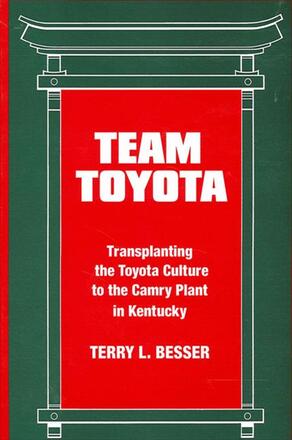
Team Toyota
Transplanting the Toyota Culture to the Camry Plant in Kentucky
Alternative formats available from:
Examines the Toyota team culture as a conceptual framework and uses it to discuss related topics, such as workplace injuries, the implications of alienating assembly workers, and the role of women.
Description
In Team Toyota Besser presents the results of an in-depth study of Toyota's assembly plant in Georgetown, Kentucky. Based on employee interviews, analyses of company publications, newspaper accounts, interaction with company employees and attendance at company events over a five-year period, this book documents how Toyota is replicating its style of management and its team culture in its Kentucky plant. Team Toyota is one of the few books about Japanese organizations that incorporates the perspectives of both nonmanagement and management employees.
The author, using "team" as an organizing metaphor, shows how Toyota is able to penetrate the small work group to increase employee commitment and recruit support for organizational goal achievement. The team metaphor shows how Toyota coordinates the myriad of departments, occupational categories and managerial levels into a "community of fate" (we're all in this together) ideology. Further, the team concept is used to elaborate an important and problematic component of workers' reality at the Camry plant--workplace disabilities. An overview of the position of female employees and wives of Japanese executives at Toyota's Kentucky plant is also provided.
Terry L. Besser is Assistant Professor of Sociology at Iowa State University.
Reviews
"This is a very good organizational analysis of a Japanese transplant. The author exposes many of the problems involved in the lean production system and presents aspects that have, as yet, not been sufficiently analyzed. By doing so, she poses good questions concerning American managers' experience with lean production. Although many of her findings are supported in other publications, hers is the best organizational analysis I have read. Anyone interested in labor relations, the auto industry, sociology of work, and Japanese management will find this book fascinating. " -- Laurie Graham, Indiana University